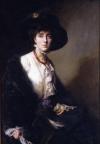Biography
Born 9th. March 1892, in Knole Castle, Kent, England; died 2nd. June 1962, at Sissinghurst Castle, Kent.
British poet, novelist, and biographer.
Full name: Victoria Mary Sackville-West
She was the only child of the third Baron Sackville and Lady Victoria Sackville.
Her ancestral home was Knole Castle which was originally a gift from Queen Elizabeth I to her forebear Thomas Sackville. Vita Sackville-West is the model for Virginia Woolf's Orlando which uses the ancestral background.
Vita Sackville-West was educated privately.
She started writing novels and plays as a child.
In 1913 she married the diplomat Harold Nicolson and travelled with him to Persia which is described in Passenger to Teheran, (1926). They had two sons, Nigel and Benedict. Their marriage survived despite his homosexuality and her own lesbian affair with Virginia Woolf who she met in 1922.
While engaged to Harold Nicolson she had a passionate secret love affair with Rosamund Grosvenor.
When married she caused a scandal by having a very public affair with Violet Keppel. Their affair continued after Violet married and became Violet Trefusis in 1919. The affair reached a climax when they went away together to Paris, and Denys Trefusis and Harold Nicolson sought them out and persuaded their wives to return to their homes. The affair was fictionalised in Vita Sackville-West's novel Challenge, (1924), with Julian representing Vita Sackville-West.
Vita Sackville-West won the Hawthornden Prize for her long poem The Land in 1927.
In 1931 she had a brief love affair with the journalist Evelyn Irons.
She was a keen gardener at her home in Sissinghurst in Kent. In 1948 Denton Welch came to visit shortly before his death.
She wrote a weekly gardening column for The Observer for many years. These were published as collections in 1951, 1953, 1955, and 1958.
Vita Sackville-West wrote about 50 books, but is best known for her novels The Edwardians, (1930), a sensitive portrait of an era, and All Passion Spent, (1931), an account of an usual marriage and aging.






